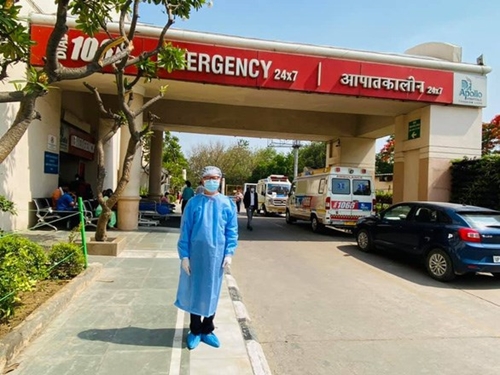India is currently witnessing the worst COVID-19 surge in the world with infections and deaths seeing record spikes on a daily basis. More than 1 million new cases have been reported over the past three days, bringing the nation’s healthcare system to its knees and pushing the country into an unprecedented crisis.
The devastating situation has put millions of lives and livelihoods at risk, including among the Vietnamese expat community.
Huynh Thuy Vy, a Vietnamese expat in Chennai Capital in Tamil Nadu State, told the Vietnam News Agency that things have been much worse since the resurgence of the pandemic last month.
Her beauty salon has received few customers lately and would be closed for the next several days.
    |
 |
|
Vietnam Ambassador to India Pham Sanh Chau stands in front of a hospital where a Vietnamese engineer working for the Vietnam Embassy has been treated for infection with the coronavirus in New Delhi, India. |
Travelling and getting access to essentials have become difficult and Vy said her family tried to avoid going outside and maintain a healthy diet during the pandemic.
She even stored a range of different types of medicine just in case.
“The cost of hospital treatment has been incredibly expensive. Plus hospitals are already overcrowded and have a severe shortage of health staff and medical equipment and supplies,” she said.
Tami Nadu is among the states hit hard by the second wave of COVID-19 with more than 15,000 newly infected cases added daily in the last few days, and active cases as of April 26 topping 100,000 cases.
The local government has announced stringent curbs, including the closure of shopping complex, malls, beauty spas and salons. A complete lockdown is set to be applied on May 2.
Vy said a friend of her family flew to India for healthcare treatment but got stuck due to the pandemic.
“They are struggling to get back home on the next rescue flight, but I’m not sure if they managed to do that as the pandemic is getting worse,” she said.
Nguyen Viet Thanh, a PhD student at Odisha University of Agriculture and Technology in Odisha State, also expressed concern about the COVID-19 crisis.
When the first wave of coronavirus hit India last September, Thanh had to return to Vietnam due to the closure of the school. He recently returned to India to finish his studies, but doing so is impossible amid the crisis.
Thanh said what surprised him the most was that many people did not wear face masks and still gathered in temples or at street food stalls without keeping physical distance.
Some parts of his school campus have been used as isolation areas for COVID-19 patients. Thanh said all he could do now was to avoid gatherings, wear masks and gloves and wash his hands properly.
Vy and Thanh are among those lucky to be healthy in the epicenter of the pandemic. On Saturday, AFP reported India hit the rate of one COVID-19 death in just under every four minutes in Delhi.
Overwhelmed
As the healthcare system is already overwhelmed and unable to take care of local people, the risk of serious illness or death of foreign residents is very high if they get infected.
Nhan, a Vietnamese engineer working for the Vietnamese Embassy in the capital New Delhi, was left in critical condition after contracting the coronavirus.
In a letter, Vietnam Ambassador to India Pham Sanh Chau sent to Tuoi Tre (Youth) newspaper April 25, he wrote to the infected engineer: "Nhan, please don't die!"
The engineer had a constant high fever and a blood oxygen level down below 90 per cent. He was at high risk of super infection and needed to go to a hospital immediately.
He needed a COVID-19 test to be hospitalized and had to wait three days for a test as most testing facilities were overloaded. After three days of waiting, he received his positive result.
With the embassy’s support, Nhan was finally hospitalized for treatment after three hospitals refused to receive him. He received the oxygen cylinder when his oxygen level had fallen below 80 per cent.
Do Thanh Hai, Counselor and Deputy Chief of Mission at the Embassy of Vietnam in India, said most of the 1,000 registered Vietnamese expats in India had gone home.
Currently, only about 100 Vietnamese expats remain scattered across India and the embassy has kept in touch with them to give support when needed.
Hai said a strict lockdown had been imposed in New Delhi and travelling had become difficult, so the Embassy had sent people to collect and supply food for those in need.
He added that the embassy had not received any urgent requests from the Vietnamese community, except for a few COVID-19 infected Vietnamese engineers involved in the construction project of the embassy in the capital New Delhi recently.
In the context of the intense outbreak, the embassy had to switch to remote work but had maintained basic activities to serve the protection of citizens when necessary.
An embassy official had also been infected and was currently in quarantine. The official was in good health and was making positive progress, he said.
Source: VNA